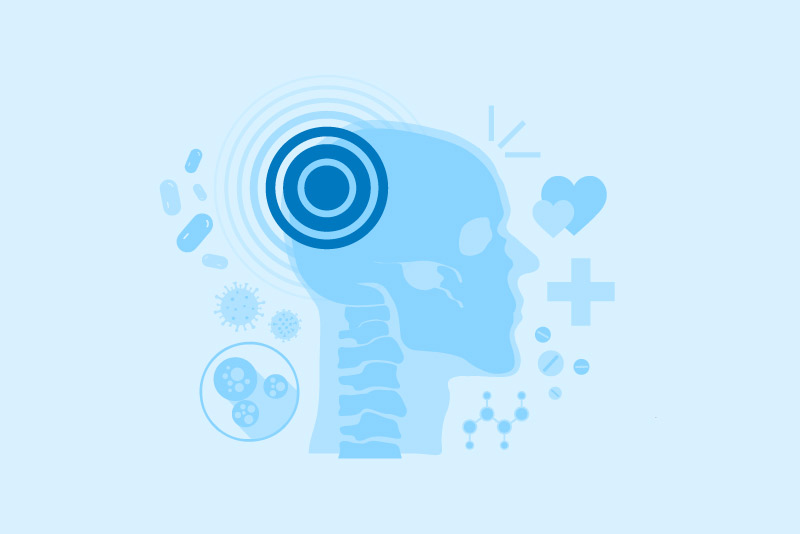Are you interested in learning how to reverse cognitive decline? This article delves into effective strategies for enhancing cognitive function. We will discuss gaining insights into cognitive decline, pinpointing its underlying causes, adopting lifestyle adjustments, engaging in cognitive training, and more.
Key Takeaways
- Various factors, including age, chronic health conditions, and lifestyle choices, can influence cognitive decline; addressing these can help mitigate risks and improve cognitive health.
- Adopting a brain-healthy lifestyle through balanced nutrition, regular physical activity, and stress reduction techniques is essential for maintaining cognitive functions and preventing progression to dementia.
- Early diagnosis and management of cognitive impairment are crucial, and ongoing clinical research is exploring new interventions to reverse cognitive decline.
Understanding Cognitive Decline
Cognitive health involves the ability to think and learn effectively, as well as maintaining clear memory function. It encompasses a range of cognitive functions, including memory, attention, and problem-solving skills, which are vital for daily life. Mild cognitive impairment (MCI) represents a transitional phase between normal age-related cognitive changes and more severe dementia. Individuals with MCI may notice subtle memory loss or thinking issues, but these typically do not severely disrupt daily life. However, MCI can elevate the likelihood of progressing to dementia.
Age is the most significant risk factor for developing mild cognitive impairment. As we age, our cognitive abilities naturally decline, but this process can be accelerated by various factors, including age-related mental decline. Poor sleep quality, for instance, is associated with an increased risk of cognitive decline and impairment. Both insufficient and excessive sleep can lead to cognitive performance issues.
Social isolation is another critical risk factor. Older adults who experience social isolation are more likely to suffer from cognitive decline, depression, and anxiety. Maintaining social connections is essential for cognitive health and overall well-being.
Understanding these aspects of cognitive decline helps us recognize the early signs and take proactive measures to mitigate its impact. Addressing the underlying causes and adopting a brain-healthy lifestyle can significantly improve cognitive function and quality of life.
Identifying Causes of Cognitive Decline
Identifying the causes of cognitive decline is vital for creating strategies to prevent and reverse it. Chronic inflammation is a significant factor that can adversely impact cognitive function. Inflammatory processes in the brain can lead to neuronal damage and impair cognitive abilities over time.
High blood pressure is another critical risk factor. It can contribute to cognitive decline by damaging blood vessels in the brain, leading to reduced blood flow and brain damage, including traumatic brain injury. Keeping blood pressure under control maintains brain health and prevents cognitive impairment.
Recent studies highlight that mild cognitive impairment is significantly underdiagnosed, with only 8% of expected cases being identified among older adults. This underdiagnosis can delay necessary interventions and exacerbate cognitive decline. Early recognition and intervention can prevent further deterioration and improve cognitive health outcomes.
Lifestyle Changes to Improve Brain Health
Many lifestyle factors can be changed or managed to support cognitive health. Taking care of physical health improves cognitive function, and lifestyle changes may delay or prevent the progression of dementia in individuals at risk.
Key areas to focus on include healthy eating habits, regular exercise, and stress reduction techniques.
Healthy Eating Habits
A healthy, balanced diet supports brain health and overall well-being.
The MIND diet, which combines elements of the Mediterranean and DASH diets, is associated with reduced Alzheimer’s risk and slower cognitive decline.
Observational studies suggest that the Mediterranean diet, rich in:
- fruits
- vegetables
- whole grains
- lean meats
- fish
- poultry
- low-fat dairy
is linked to a lower risk of developing dementia.
Nutrient deficiencies can negatively impact cognitive health. Adequate intake of vitamins, such as vitamin E, helps maintain cognitive function and reduce cognitive decline. Recent findings suggest that multivitamins may improve memory and cognition in older adults.
Incorporating these dietary habits into daily life can support brain health and cognitive function. A brain-healthy diet not only benefits cognitive abilities but also contributes to cardiovascular health and overall well-being.
Exercise Regularly
Regular physical activity is fundamental for cognitive health. It enhances cognitive function by increasing glucose metabolism in the brain. Exercise improves memory, provides mental and social stimulation, and increases blood flow to the brain. Physical exercise at least twice a week is recommended to boost cognition.
Adults should aim for at least 150 minutes (2.5 hours) of physical activity per week to maintain cardiovascular health and cognitive function. Safe movement techniques are encouraged to prevent falls while exercising. Activities such as playing a musical instrument or acquiring a new language can also positively influence cognitive functions and overall brain health.
Bilingualism has been shown to strengthen brain connectivity, potentially delaying cognitive impairment. Combining physical and mental exercises can lead to better cognitive function and a lower risk of cognitive decline.
Stress Reduction Techniques
Stress significantly impacts cognitive function and mental health. Meditation practices, such as mindfulness and focused breathing, help reduce stress and improve concentration. Engaging in spiritual practices, such as prayer or communal worship, can foster a sense of belonging and peace, contributing to mental well-being.
Meditation combined with spiritual practices enhances cognitive function and reduces stress-related brain impacts. These practices improve cognition, provide mental stimulation, and promote a brain-healthy lifestyle.
Cognitive Training and Mental Stimulation
Cognitive training targets improvement in specific cognitive skills. Stress reduction practices enhance cognitive function and overall brain health. Practices like mindfulness and meditation can help mitigate stress, which is beneficial for cognitive health.
Learning multiple new skills simultaneously can lead to significant improvements in cognitive abilities and functional independence. Social activities enhance cognitive functions like memory, attention, and problem-solving skills. Meaningful interactions challenge the brain and foster the creation of new neural connections, contributing to cognitive resilience.
Memory Exercises
Engaging in memorization tasks can significantly enhance one’s ability to recall information. Memory exercises can improve both working memory and cognitive control. Activities like crossword puzzles and jigsaw puzzles can stimulate memory and delay cognitive decline. Playing card games may improve short-term memory and enhance pattern recognition abilities.
Memory exercises play a key role in improving cognition and reversing memory problems. Collectively, these activities can lead to significant improvements in cognitive health and memory function.
Learning New Skills
Studies involving older adults show that learning new skills, such as quilting, can improve memory function. Learning new skills significantly enhances cognitive function and memory. Engaging in activities like quilting or photography can be enjoyable and mentally stimulating.
By participating in skill-building activities, individuals can foster better mental health and potentially mitigate cognitive decline. These activities provide mental stimulation and contribute to a brain-healthy lifestyle.
Managing Health Conditions
Managing chronic health issues like diabetes significantly enhances cognitive function. Managing blood pressure, diabetes, and sleep disturbances may help prevent or delay cognitive decline. High blood pressure, diabetes, sleep disturbances, and chronic inflammation can negatively affect brain function.
Improving cardiovascular health can provide significant benefits. It plays a crucial role in protecting both brain and heart health.
Controlling Blood Pressure
High blood pressure increases the risk of cognitive decline later in life. Controlling high blood pressure through exercise, dietary changes, and medication is effective. Physical activity improves brain health by increasing glucose metabolism and boosting brain health proteins.
A diverse, plant-rich diet is associated with a decreased risk of cognitive decline and dementia.
Addressing Sleep Issues
Poor sleep negatively impacts cognitive health, contributing to memory problems and cognitive decline. Sleep disturbances can exacerbate conditions associated with cognitive decline, such as Alzheimer’s disease. A regular sleep schedule with consistent bedtimes and wake times improves sleep quality.
Relaxation techniques like deep breathing or meditation before bed enhance sleep onset. Avoiding caffeine and heavy meals close to bedtime can promote better sleep and cognitive function.
Treating Chronic Diseases
Managing chronic diseases is vital for preserving cognitive functions and protecting brain cells. Effective diabetes management protects brain cells and cognitive functions. Proper treatment of diabetes can help ensure better cognitive health outcomes.
The Role of Social Connections
Strong social connections support cognitive function and may lower the risk of decline. Research has found that older adults with high social engagement tend to have better cognitive health in later life. Community events and interest-based groups provide opportunities for social participation, benefiting brain health.
Social activities mitigate the risks of cognitive decline associated with aging. Strong relationships release neurotransmitters that promote positive emotions and enhance overall well-being.
Clinical Trials and Research
Studies indicate that targeted interventions can slow cognitive decline in older adults. A recent FDA-approved Alzheimer’s disease treatment, Lecanemab, has demonstrated a moderate slowdown in cognitive decline among early-stage patients.
Clinical trials are exploring interventions to potentially prevent cognitive decline and reverse cognitive decline in older adults.
Ongoing Studies
The AHEAD study is currently enrolling participants at risk for Alzheimer’s due to elevated brain amyloid levels, focusing on those as young as 55. A clinical trial named METRIcAL is testing a personalized music program to enhance the quality of life for nursing home residents with Alzheimer’s. The trial focuses on using personalized music programs to enhance engagement in nursing home residents with dementia.
The Hospice Advanced Dementia Symptom Management trial aims to improve care quality for individuals with advanced dementia through a new supportive program. The APPROACHES study aims to improve advanced care planning for Alzheimer’s patients and their families in nursing homes.
Research and clinical trials are essential for finding new ways to reverse cognitive decline and improve cognitive health.
Key Findings
In a study, lecanemab slowed clinical decline in Alzheimer’s patients by 27% over 18 months compared to a placebo. The FDA approved lecanemab in 2023 as the first treatment targeting the underlying causes of Alzheimer’s disease, aiming to slow its progression.
Studies indicate that cognitive stimulation therapy can significantly reduce depression symptoms in individuals with mild to moderate dementia. Telehealth interventions have shown promise in improving care coordination for individuals with dementia.
Monitoring and Assessment Tools
Cognitive assessments such as the Saint Louis University Mental Status (SLUMS) Examination and the Short Portable Mental Status Questionnaire (SPMSQ) are used to evaluate cognitive function and identify impairment. The Montreal Cognitive Assessment (MoCA) is a quick tool designed to identify mild cognitive impairment through a 10 to 12-minute evaluation. MoCA evaluates various aspects of cognitive function, with a maximum score of 30; a score below 26 may indicate potential cognitive impairment.
MoCA is preferred over the Mini-Mental State Examination (MMSE) for early detection of dementia, especially for milder forms. The Medicare wellness visit is an underutilized opportunity that can help identify cognitive concerns among beneficiaries. Monitoring cognitive health is crucial for detecting early signs of cognitive impairment and dementia.
Summary
Cognitive decline is a multifaceted issue that can be managed through various strategies. Adopting a brain-healthy lifestyle, including proper diet, regular exercise, and stress reduction techniques, can significantly improve cognitive function and delay the progression of cognitive impairment. Cognitive training and social connections also play vital roles in maintaining cognitive health.
Continued research and clinical trials are essential for developing new interventions and treatments to reverse cognitive decline. By staying informed and proactive, individuals can take control of their cognitive health and enjoy a better quality of life.
Frequently Asked Questions
What is mild cognitive impairment (MCI)?
Mild cognitive impairment (MCI) is a condition characterized by noticeable yet subtle changes in memory and thinking skills, serving as a transitional phase between normal cognitive aging and more severe dementia. While individuals with MCI may face some difficulties, their daily functioning is generally not significantly impacted.
How can I prevent cognitive decline?
To prevent cognitive decline, adopt a brain-healthy lifestyle that includes a balanced diet, regular physical activity, and stress management. Stay socially connected and engage in cognitive training. Managing health conditions such as high blood pressure and diabetes is equally important.
What are the benefits of the Mediterranean diet for brain health?
The Mediterranean diet significantly benefits brain health by lowering the risk of dementia and reducing the likelihood of Alzheimer's disease while also promoting slower cognitive decline. Incorporating its elements can enhance cognitive function and overall mental well-being.
How does physical exercise affect cognitive function?
Physical exercise significantly enhances cognitive function by improving glucose metabolism, boosting memory, and increasing blood flow to the brain. Engaging in at least 150 minutes of physical activity each week is essential for maintaining optimal cognitive health.
What are some effective stress reduction techniques for improving cognitive health?
Meditation techniques, including mindfulness and focused breathing, and spiritual practices like prayer effectively reduce stress and enhance cognitive health. Incorporating these practices into your routine can significantly improve concentration and overall mental function.
Further Reading









